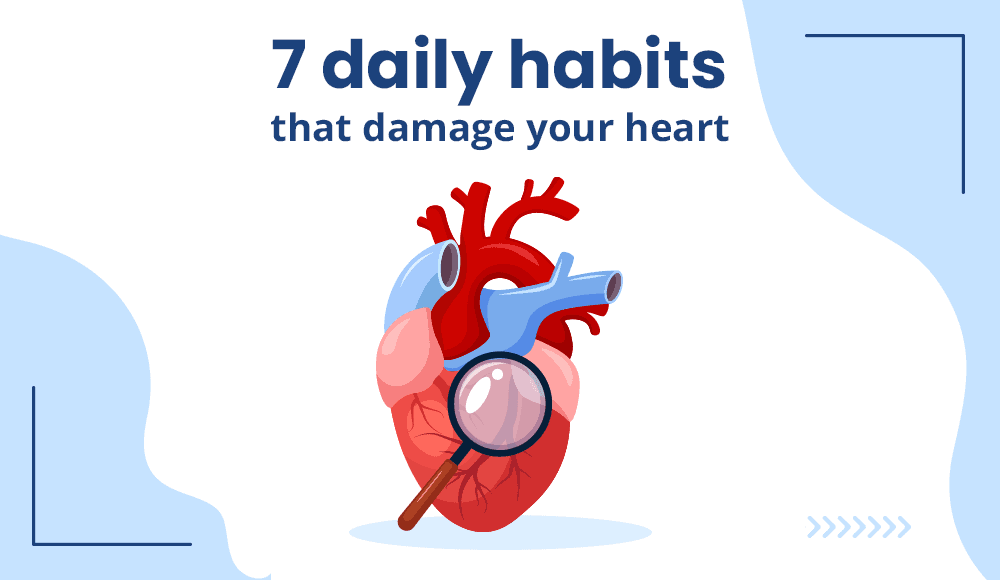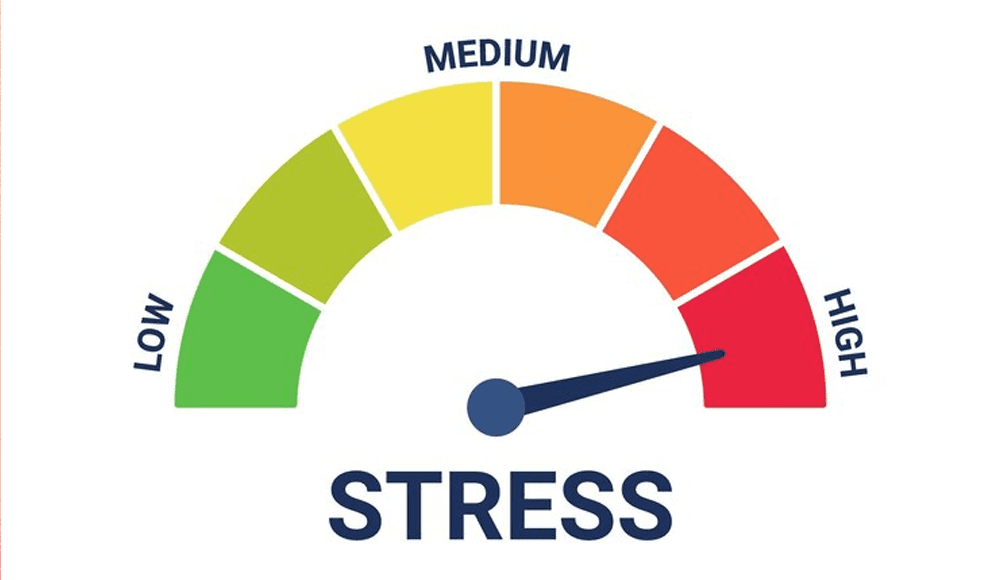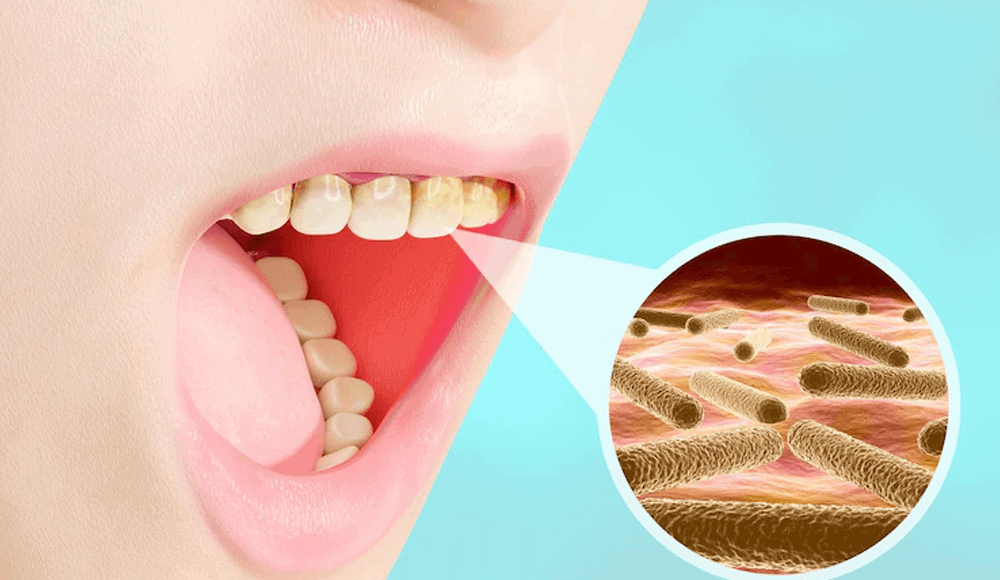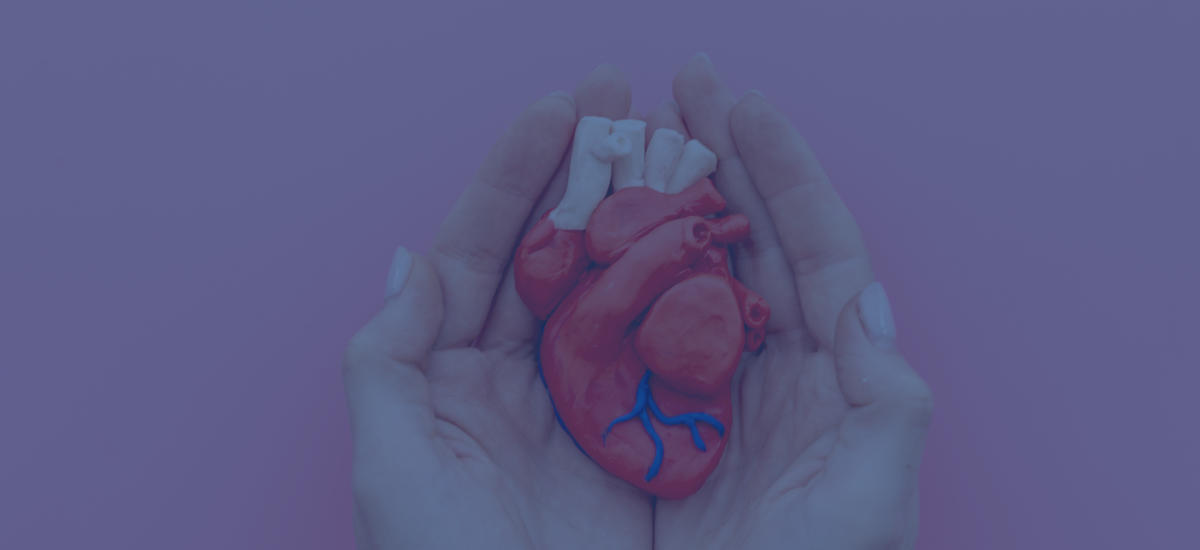It is quite simple to fall into an unhealthy habit, be it something as minor as biting your nails or something with a bit more health risk, such as getting used to an unhealthy diet. While it may not seem like it, all unhealthy habits tend to have cumulative effects that can often have long-lasting effects on a person’s body.
The effects could be as simple as poor hygiene or something serious that could lead to the formation of plaque in your arteries. While treatments such as angioplasty and heart bypass surgery can fix these issues and help improve your health, it is better to make a conscious choice of getting out of these habits that damage your heart. It can help prevent such issues from arising.
In order to help you overcome such unhealthy habits, we have created a list of 7 daily habits that can damage your heart. We’ll discuss how these habits can get in the way of you living a healthy life.
Discover the habits that harm your heart health & consult the doctor about how to avoid it
List Of Heart-Harming Habits In Your Routine
1. Living A Sedentary Lifestyle
Although the Covid-19 pandemic was eye-opening for a lot of reasons, it still forced people into a few unhealthy habits, including a sedentary life with little to no activity. Be it working from their desk or watching some tv-show, people got used to spending long hours sitting in one place. Being inactive, especially when combined with an unhealthy diet, can lead to fatty tissue buildup in your heart.
Remember, prior to the pandemic, even when people had desk jobs, they at least had to leave their homes and travel to their workplaces. In most cases, people relied on an active commute to reach their work, which included enough activity to bring about positive health effects in their life.
How To Get Out Of A Sedentary Lifestyle?
To maintain a healthy body, it’s crucial to move around and modify your lifestyle.
- Set up and religiously follow an exercise routine.
- Active commute (walking & cycling in combination of public transport).
- Taking walks during your lunch breaks.
- Spending more time on activities rather than watching tv or web shows.
- Taking the stairs instead of relying on elevators.
For more information, see our blog post 9 Lifestyle Changes You Need To Make For A Healthy Heart.
2. Skipping Breakfast
Breakfast is the most important meal of the day, and skipping it is a bad habit for your health and is associated with a high risk of cardiovascular disease. Not eating breakfast causes irregular eating patterns. In the long term, this habit can cause weight gain, which is not so great for heart health.
How Does Eating Breakfast Everyday Help Us?
Eating a healthy breakfast every morning helps jumpstart your system and gets all the organs, including your heart, to function optimally. It also lowers the risk of cholesterol and high blood pressure. It also gets the stomach juices flowing. This makes your body work harder to digest the food, which in turn is good for the heart. Visit our blog post, 15 Incredibly Heart-Healthy Foods, to learn more about the kinds of foods that should be consumed to promote heart health.
How To Overcome The Unhealthy Habit of Skipping Breakfast?
First, you have to understand the cause of this unhealthy habit. Many people simply do not have the time to cook in the early morning and therefore tend to skip breakfast in favour of eating an early lunch. In these cases, people can try to prepare their breakfast the day before and heat it up in the morning. On the other hand, if you have only a little time in the morning, you can start small and prepare quick meals such as hard-boiled eggs, omelettes, green tea, oatmeal, yoghurts, or coffee.
3. Sleeping Less Than Standard Hours
People who sleep less than 7 hours every night experience quite a few consequences, including chronic fatigue and low energy. This is one of the worst habits for your heart. If you continue on the same path, you are also most likely to experience health problems, such as heart attack, depression, and increased asthma attacks in patients already suffering from asthma.
Why Does Not Getting Enough Sleep Cause Health Issues?
Because typically when a person is sleeping at night, their blood pressure lowers. Sleeping less than standard hours reduces this dipping of BP at night. This can increase the risk to your heart and may lead to heart disease, stroke and heart attacks.
Many people sometimes just fall into poor sleeping habits and fail to get out of them. Not getting enough sleep is one such habit. You can let go of this bad habit with the following tips.
How To Improve Your Sleep Quality?
- Avoid consuming coffee or alcohol late in the day.
- Avoid taking unnecessary long daytime naps.
- Create a sleep routine with consistent sleep and wake up times.
- Creating a soothing bedroom environment.
- Avoid exercising 2-3 hours before bedtime.
4. High-stress levels
A lot of people today work in high-pressure and high-stress environments, which can have adverse effects on their health. While high-stress levels may not directly affect your heart, they may lead to fluctuating blood pressure levels. A repeated elevation in blood pressure due to stress can cause hypertension, which, in turn, could lead to diseases caused by bad habits, such as heart attack and stroke. Stress also contributes to other cardiovascular disease risks such as smoking, lack of physical activity and so on.
How to Relieve Stress:
- Add some form of physical activity to your daily routine.
- Also, schedule meditation time for at least 5-10 minutes a day.
- Start a nutrition-rich healthy diet.
- Keep a journal and use it to write down your feelings and thoughts.
- Also, consider going to therapy or getting counselling.
5. Excessive Drinking & Smoking
Excessive Drinking:
According to MayoClinic, moderate alcohol consumption has health benefits, including lowering the risk of developing heart disease. But the word moderation here is the key. Excessive consumption of alcohol or excessive smoking are two bad habits for health, and they are very hard to get rid of. Thus, people with pre-existing heart problems should control their alcohol intake.
How to curb your excessive drinking:
- Start by getting rid of all the alcohol in your home.
- Determine your drinking limit and stick to that goal.
- Keep a drinking diary that can help you keep track of your drinks.
- Take a break from alcohol by choosing 2-3 days a week on which you abstain.
- Don’t hesitate in asking your friends and family members to help you.
Excessive Smoking:
While consumption of alcohol in moderate amounts may have some benefits, smoking generally comes with more health risks. Excessive smoking, in particular, damages the blood vessels reducing the amount of oxygen in the blood and making the heart beat quicker. Younger generations have become more prone to this habit and are more likely to develop cardiac conditions. These youngsters can avoid cardiac episodes by using effective prevention tips.
How To Resist Smoking:
- Add physical activity to your day. It will distract you from the cravings.
- Replace tobacco with sugarless gum, hard candy, sunflower seeds, or raw carrots. This will also keep the cravings at bay.
- Try relaxation techniques such as yoga, deep breathing exercises, meditation, listening to calming music, drawing, etc.
- Even if you relapse, don’t be too hard on yourself. Keep trying.
- Remind yourself of the reasons you decided to quit smoking.
6. Unhealthy Fast Food Diet
Although eating fast food as a meal isn’t the end of the world, overconsumption of unhealthy junk food can have adverse effects on your overall health. Overeating junk food can also increase the risk of developing heart conditions.
Keep in mind junk food increases the risk of premature heart disease and diabetes. Fast food is full of sodium, cholesterol and saturated fats. Adding a large soda beverage to a meal only brings in an unnecessary amount of added sugar, which may result in weight-related issues such as obesity.
How To Stop Eating Foods That Are Damaging To Your Health?
- Make an active effort to eat a healthy, well-balanced diet not only for your heart but for your overall well-being, So plan healthy meals ahead of time to handle your cravings.
- Replace your snacks with Fruits rich in vitamins, fibre, antioxidants, and water.
- Add protein to your diet. It will make you feel full.
- Add foods containing healthy fats to your diet. You can try avocados and nuts.
- Get the standard hours of sleep and manage your stress since factors such as poor sleep and stressful life also affect food cravings.
7. Lack Of Dental Hygiene
Maintaining optimal oral hygiene is a crucial part of your overall well-being. Poor dental health raises the risks of a bacterial infection in the bloodstream that can affect the heart valves. Maintaining your oral health is vital if you have artificial heart valves. There is also a connection between tooth loss patterns and coronary artery disease. Oral health may not be a key to heart disease prevention, but it is still essential to take care of your teeth and gums.
How to maintain Dental hygiene:
- Brush your teeth twice a day and floss regularly.
- Rinse your mouth with diluted mouthwash to remineralize your teeth and clean areas that are hard to reach with a brush.
- Use toothpaste containing fluoride to ensure good heart health
- Reduce the amount of sugary and acidic foods you consume
- Regular visits to dentists are mandatory to maintain dental hygiene
Discover the habits that harm your heart health & consult the doctor about how to avoid it
Conclusion
You don’t need to aim for a complete transformation in a week. Gradually stopping your bad habits can make a huge difference in your overall health. However, if you ever experience heart-related problems, you should not hesitate to contact an experienced cardiovascular surgeon in Mumbai or visit the nearest emergency room.
A cardiac surgeon can not only help determine the cause of your issues but also offer appropriate treatment to fix the issue. You can also refer to our page, “Open Heart Surgery Cost In Mumbai” to stay informed.
- Note down all the bad habits you want to put an end to. This makes them tangible, and you can use them as a guide. Ensure that you’re specific and realistic while creating this list.
- Gradually start the process of changing. Don’t try to change all your bad habits at once. When a change turns into second nature, you can add another goal. Keep doing this until you complete your list.
- Even if you experience a setback, do not worry about it. You might feel like giving up but don’t. Keep in mind that it takes time for changes to turn into habits. Once you achieve your desired changes you’ll be on your way to the ultimate goal: maintaining a healthy heart.
To learn more about heart diseases and their treatments such as heart bypass surgery, heart transplant surgery and more you can contact us.











